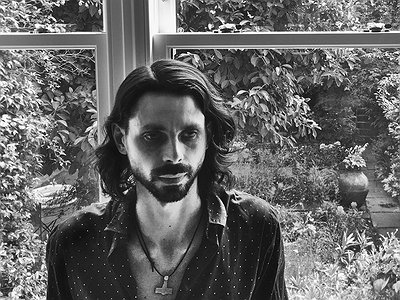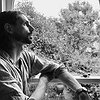Name: Robin Schlochtermeier
Nationality: Anglo-German
Occupation: Composer
Current Release: Spectral on Denovali
Recommendation: The Archetype of Initiation, a collection of essays by Robert L Moore on the subject of
transformative, sacred and liminal spaces. It’s a short book that sums up
and evokes one of the core underexplored needs of our time – the need
for the sacred. I don’t belong to any particular spiritual tradition but
the message in the book speaks directly to my heart as a human being.
Website/Contact: Robin has a website that highlights his work and credits robinschlochtermeier.com
When did you start composing - and what or who were your early passions and influences?
I started out writing songs for the bands I was in as a teenager. When we would get together to rehearse, there would always be puzzled looks by everyone and the question “what shall we play?” came up. I had played in orchestras and could read music so it seemed to naturally fall to me to make up parts for everyone.
At the same time, I had an incredible music teacher, who played us avant-garde classical composers like Luigi Nono and Luciano Berio. I loved listening to this music, hearing about the ideas behind it, and experimenting with trying out similar concepts. My teacher, who was also my conductor in the youth orchestra, was quite far-out for a secondary school. He even had us compose in a serialist (12-tone) style!
This mix of avant-garde, classical and contemporary music has been a constant for me. My typical week as a teen would include spending time in the music section of the local library reading about jazz and listening to Philip Glass after school, coming home and making attempts at abstract video art with computer-generated noise music over the top, and rehearsing in punk bands at the weekend.
I’ve had a foot in both camps (classical, songwriting) since then. I wrote and recorded with a rock band in the 2000s and then moved into writing for film and TV. It turned out that for films, having leftfield musical tastes was a good thing. I initially did scoring work for quite a few films and TV shows with a horror/thriller inflection as a result.
It took me a long time of composing music to work out that I didn’t particularly like any one existing style enough to become a fully-fledged adopter. In this process, I tried a lot of different conceptual approaches. As I was doing so I increasingly felt the need to explore the question of my own voice separately from film.
For most artists, originality is first preceded by a phase of learning and, often, emulating others. What was this like for you? How would you describe your own development as an artist and the transition towards your own voice? What is the relationship between copying, learning and your own creativity?
I spent a long time striving for originality by trying out single-minded conceptual ideas. I gradually uncovered a more personal approach by discovering what didn’t resonate so much in these experiments – this was a sign that I needed to go down a different route. For me it’s been a process of elimination that way, stripping away some of the less authentic ways of working. Having said that, I am fully aware I exist in a huge web of interconnected culture, and I wouldn’t pretend that my own voice is somehow separate from all of that.
What were some of the most important creative challenges when starting out as a composer and how have they changed over time?
When I started out I saw the world very much in binary colours – digital on the one side, acoustic instruments on the other. Now I don’t see it that way at all anymore. I feel that life and feeling can come from lots of places. The most interesting things happen for me these days at the intersection of the organic and the digital.
Tell us about your studio/work space, please. What were criteria when setting it up and how does this environment influence the creative process? How important, relatively speaking, are factors like mood, ergonomics, haptics and technology for you?
As my studio is in central London, space is the most difficult commodity to come by. I’ve turned this into a positive by setting my studio up so everything is within arm’s length – piano behind me, workstation in front, guitars and percussion instruments on the walls next to me, mics set up permanently ready to go etc. It sometimes feels like being in an airplane cockpit – except I’m below street level so the views are nothing at all like that.
Could you take us through a day in your life, from a possible morning routine through to your work? Do you have a fixed schedule? How do music and other aspects of your life feed back into each other - do you separate them or instead try to make them blend seamlessly?
I usually work a fairly standard 9:30 – 5:30 day in order to accommodate my family life. Most weeks I also work in the evenings – there never seems to be quite enough time to do everything these days. Despite this, music is quite fluidly integrated into my life. For example, in periods where I’m writing a lot I’ll often walk past the piano after brushing my teeth, improvise for a few minutes, and then head to bed.
There are many descriptions of the ideal state of mind for being creative. What is it like for you? What supports this ideal state of mind and what are distractions? Are there strategies to enter into this state more easily?
Ah! This is a favourite subject of mine. I occasionally work with a group creativity practice called “Play Date” which involves something called a “brain stretch”. Essentially this is an exercise in widening the possible answers to creative questions by turning concepts on their head, trying out ridiculous impossible answers and deliberately considering absurdities. It’s very effective – these practice sessions can sometimes inspire new ideas and open up my approach for months afterwards.
Could you take me through the process of composing on the basis of one of your pieces that's particularly dear to you, please? Where did the ideas come from, how were they transformed in your mind, what did you start with and how do you refine these beginnings into the finished work of art?
Let’s take the piece “Sonnenstaub” from my album Spectral. The title means “sun dust” and refers to the dust motes you can see dancing in the air when there is a small ray of sunlight coming into a dark room. I had a few very profound experiences observing these particles with my baby daughter and this immediately suggested a musical form.
What I did was build a virtual instrument that created small clouds of repeated notes from my own sampled prepared piano. I used these clusters of randomly repeating notes as a basis for the piece. The idea of the sun also suggested solar winds, which led me to create deep noise swooshes in the piece that come and go. The rest is a very simple, almost naïve harmonic progression on the piano that encapsulates my feelings of caring and nurture that coexisted in those moments with my feelings of awe and mystique.






